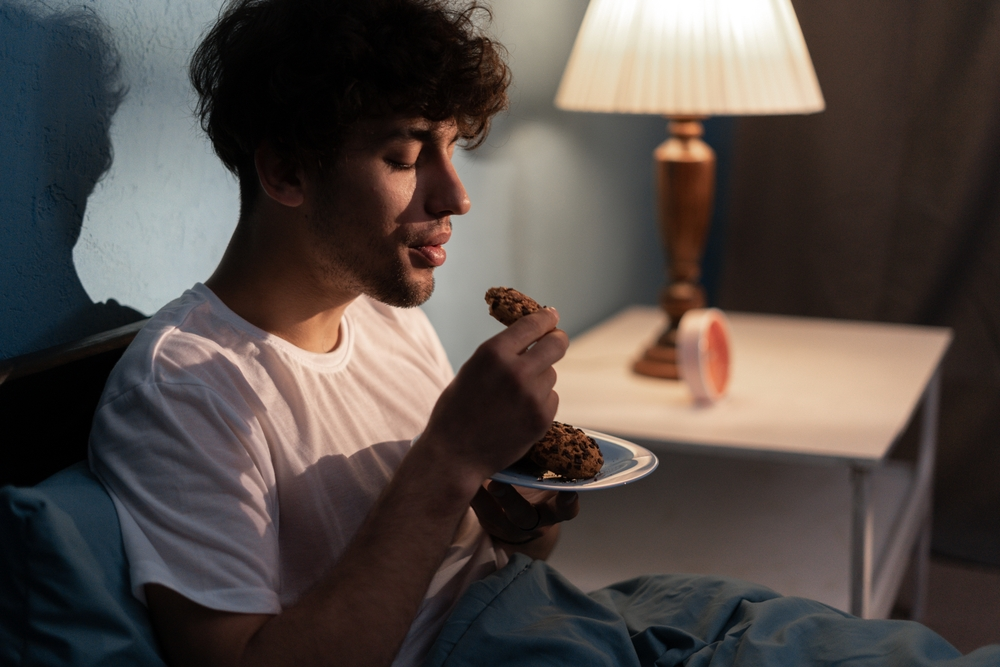Binge Eating Disorder (BED) is more than just overeating during the holidays or occasionally having seconds at dinner. It’s a recognized mental health condition that affects millions of people across the U.S.—often in silence. At Charlotte Recovery Centers, we see firsthand how BED can take a toll on physical health, emotional wellbeing, and everyday life. The good news? It’s treatable. And with the right support, you can regain control over your relationship with food and yourself.
What Is Binge Eating Disorder?
BED is defined as recurrent episodes of eating unusually large quantities of food in a short period—typically under two hours—accompanied by a lack of control and intense feelings of guilt, shame, or distress afterward.
To meet diagnostic criteria, binge episodes must occur at least once per week for three months and include three or more of the following:
- Eating much more quickly than normal
- Eating until uncomfortably full
- Eating large amounts when not physically hungry
- Eating alone due to embarrassment
- Feeling disgusted, depressed, or very guilty afterward
What sets BED apart from other eating disorders, like bulimia nervosa, is that there are no regular purging behaviors (such as vomiting or laxative use). Individuals may try to diet or restrict after bingeing, but the “helpful” behaviors are not consistent or effective.
According to national data, Binge Eating Disorder affects about 3.5% of women, 2% of men, and 1.6% of adolescents in their lifetime.
The Binge–Restrict Cycle
Many people with BED fall into a painful loop: restrict, binge, repeat. This isn’t just about willpower—it’s about biology, emotions, and patterns that become deeply ingrained over time.
The cycle often looks like this:
- Dieting or restriction – Skipping meals or cutting out food groups in an attempt to control eating.
- Intense cravings and hunger – The body and brain respond to deprivation by ramping up hunger hormones and food preoccupation.
- Binge episode – Eating large quantities of food rapidly and in secret, followed by shame.
- Guilt and punishment – Feeling out of control or weak, often leading to more restriction or compensatory dieting.
The cycle becomes a trap that’s hard to escape—unless the root causes are addressed.
Health Risks of Binge Eating
Binge eating doesn’t always lead to weight gain, but it can contribute to serious health complications regardless of body size. These include:
- Type 2 diabetes
- High blood pressure
- Sleep apnea
- High cholesterol
- Fatty liver disease
- Depression and anxiety
A study also notes that BED also increases the risk of gastrointestinal distress and long-term cardiovascular issues. The emotional toll—especially the shame, secrecy, and isolation—can be just as damaging.
Signs of Binge Eating Disorder
Recognizing signs of binge eating disorder can help you or a loved one take the first step toward healing. Here’s what to look for:
- Frequent episodes of eating large amounts of food, often alone or in secret
- Feeling a loss of control during eating
- Eating when not physically hungry
- Stockpiling or hiding food
- Depression or anxiety related to eating habits
- Weight fluctuations or chronic dieting
- Avoidance of social events involving food
These behaviors aren’t about greed or indulgence. They’re often a way of coping with emotional pain, trauma, or low self-worth.
What Causes BED?
Like other eating disorders, BED has no single cause. It’s a mix of emotional, biological, and environmental factors:
- Emotional distress – Many people binge to cope with stress, trauma, loneliness, or sadness.
- Genetics – A family history of eating disorders or mental illness can increase risk.
- Dieting – Restrictive eating patterns, especially in childhood or adolescence, are a major trigger.
- Brain chemistry – Changes in dopamine and serotonin levels may affect reward systems and impulse control.
How to Treat Binge Eating Disorder
If you’re searching for “binge eating disorder treatment near me”, it’s important to find a program that addresses both the physical and emotional sides of recovery. At Charlotte Recovery Centers, we combine evidence-based therapies, medical support, and personalized guidance to help you rebuild a healthy relationship with food.
Treatment approaches include:
- Cognitive Behavioral Therapy (CBT) – CBT is considered the gold standard for BED. It helps individuals challenge negative thought patterns, develop coping strategies, and create structure around eating.
- Dialectical Behavior Therapy (DBT) – DBT focuses on emotional regulation and distress tolerance, teaching people how to handle difficult feelings without turning to food.
- Interpersonal Therapy (IPT) – IPT explores how relationships and unresolved conflicts contribute to eating behaviors.
- Nutritional Counseling – Working with a dietitian can restore normal eating patterns and remove the fear or guilt often associated with food.
- Medication – The FDA-approved drug Vyvanse (lisdexamfetamine) has shown effectiveness in reducing binge frequency and improving impulse control.
- Group Support and Peer Recovery – Connecting with others who understand can offer encouragement and accountability. Resources like the National Eating Disorders Association (NEDA) provide free online and in-person groups.
Recovery Is Not Linear—But It’s Worth It
The journey often includes setbacks, but it’s not a failure—it’s part of the process.
Recovery means:
- Learning to eat without guilt
- Rebuilding self-esteem
- Feeling safe and empowered around food
- Coping with stress in healthy ways
At Charlotte Recovery Centers, we help you take it one step at a time—starting with self-compassion.
Frequently Asked Questions About Binge Eating Disorder
Is binge eating the same as emotional eating?
Not quite. Emotional eating might happen occasionally in response to stress, while BED involves frequent, uncontrollable episodes that cause distress.
Can you be a normal weight and still have BED?
Yes. BED can affect people of any weight. Focusing only on size or BMI can cause people to miss important signs.
Do I have to purge for it to be an eating disorder?
No. BED does not involve purging. The absence of purging behaviors is part of what distinguishes it from bulimia.
Can BED be cured?
While there is no quick cure, BED is highly treatable. Many people go on to live healthy, fulfilling lives with little to no bingeing.
How is BED diagnosed?
A mental health professional will evaluate your symptoms, history, and emotional well-being. Some lab tests may be used to assess any physical impacts.
Is it my fault I binge eat?
Absolutely not. BED is not about laziness or lack of willpower—it’s a recognized medical condition.
What if I don’t binge every day?
You may still meet the criteria if episodes occur weekly and cause distress. Severity varies between individuals.
Are online therapy options effective?
Yes. Virtual therapy has made treatment more accessible, and many people find it just as effective as in-person care.
How do I support a loved one with BED?
Be patient, listen without judgment, and encourage professional help. Offer support without trying to control their eating.
Where can I find binge eating disorder treatment near me?
Charlotte Recovery Centers offers comprehensive treatment for BED. You can also explore the NEDA Treatment Locator for national resources.
You Deserve a Life Free from Shame and Chaos
Living with binge eating disorder can feel like being stuck in a loop you didn’t ask to be part of. But recovery isn’t about perfection—it’s about progress, one choice at a time.
At Charlotte Recovery Centers, we meet you where you are. Our compassionate team will help you break the cycle, rebuild trust with your body, and discover a new relationship with food—one grounded in balance and peace.
If you’re ready to begin, reach out today. You don’t have to do this alone.
Sources
https://pmc.ncbi.nlm.nih.gov/articles/PMC9793802






